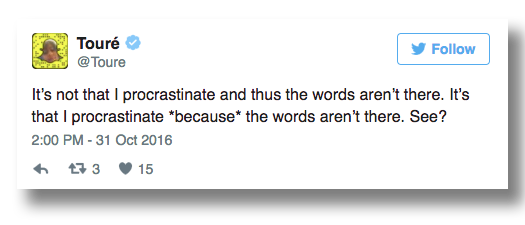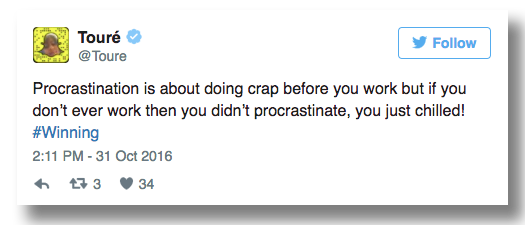Be daring, be different, be impractical, be anything that will assert integrity of purpose and imaginative vision against the play-it-safers, the creatures of the commonplace, the slaves of the ordinary.
Cecil Beaton
Official website of the author
Be daring, be different, be impractical, be anything that will assert integrity of purpose and imaginative vision against the play-it-safers, the creatures of the commonplace, the slaves of the ordinary.
Cecil Beaton
So much of writing is about starting. Getting those first few words down on the blank page or screen. Getting unstuck. Solving some problem — a scene that feels stagy or false, a knot in the plot that won’t come unknotted. A character enters a room then … what?
In 1974, the musician Brian Eno and painter Peter Schmidt first published Oblique Strategies, a tool for unlocking creative blocks. This was a printed deck of cards, each containing a short, cryptic, Zen-like koan meant to jostle the artist’s thinking and spark the creative process: “Use an old idea,” “Honour thy error as a hidden intention,” “Work at a different speed.” The idea was that the artist, frozen with indecision or out of ideas altogether, could draw a card at random, read the mysterious phrase, and somehow the creative machine would stir to life. (You can shuffle through all the cards here.)
I have always loved the idea of Oblique Strategies, but I never felt that Eno’s and Schmidt’s original messages fit me very well. All artists have their idiosyncrasies and weaknesses, their particular ways of getting snarled up. In order to work for me, oblique strategies have to target my individual, habitual ways of getting stuck. It’s like getting a shot: what’s in the needle depends on the infection you’ve got.
So here are my oblique strategies. I’ve never bothered to put them down on cards, but I have always kept a list of them, which I refer to all the time. My strategies are a little less “oblique” than the originals, less out-of-leftfield, because they are not particularly concerned with stimulating ideas. Generally my problem is not lack of ideas; it is an inability to get the ideas out of my head and down onto the page. I have the syrup, as Gertrude Stein said of Glenway Wescott, “but it does not pour.” I’ll leave my list here, for my own reference and maybe yours. Hopefully they will help some writer someday. If not, try the originals or try writing your own.
I am thirty-six years old. For eighteen years save for a short space during the war writing has been my chief interest in life, and I am in every sense a professional. Yet even now when, at the recurrent cry of “Baby Needs Shoes,” I sit down facing my sharpened pencils and a block of legal-sized paper, I have a feeling of utter helplessness. I may write my story in three days or, as is more frequently the case, it may be six weeks before I have assembled anything worthy to be sent out. I can open a volume from a criminal law library and find a thousand plots. I can go into highway and byway, parlor and kitchen, and listen to personal revelations that at the hands of other writers might endure forever. But all that is nothing — not even enough for a false start.
F. Scott Fitzgerald, “One Hundred False Starts” (1933)
According to an article in the Atlantic, the industrial designer Raymond Loewy had a theory about what makes new products desirable.
He believed that consumers are torn between two opposing forces: neophilia, a curiosity about new things; and neophobia, a fear of anything too new. As a result, they gravitate to products that are bold, but instantly comprehensible. Loewy called his grand theory “Most Advanced Yet Acceptable”—MAYA.
The theory applies equally to art.
Could Loewy’s MAYA theory double as cultural criticism? A common complaint about modern pop culture is that it has devolved into an orgy of familiarity. In her 2013 memoir cum cultural critique, Sleepless in Hollywood, the producer Lynda Obst mourned what she saw as cult worship of “pre-awareness” in the film and television industry. As the number of movies and television shows being produced each year has grown, risk-averse producers have relied heavily on films with characters and plots that audiences already know. Indeed, in 15 of the past 16 years, the highest-grossing movie in America has been a sequel of a previously successful movie (for example, Star Wars: The Force Awakens) or an adaptation of a previously successful book (The Grinch). The hit-making formula in Hollywood today seems to be built on infinitely recurring, self-sustaining loops of familiarity, like the Marvel comic universe, which thrives by interweaving movie franchises and TV spin-offs.
But perhaps the most maya-esque entertainment strategy can be found on award-winning cable television. In the past decade, the cable network FX has arguably produced the deepest lineup of prestige dramas and critically acclaimed comedies on television, including American Horror Story, The Americans, Sons of Anarchy, and Archer. The ideal FX show is a character-driven journey in which old stories wear new costumes, says Nicole Clemens, the executive vice president for series development at the network. In Sons of Anarchy, the popular drama about an outlaw motorcycle club, “you think it’s this super-über-macho motorcycle show, but it’s also a soap with handsome guys, and the plot is basically Hamlet,” she told me. In The Americans, a series about Soviet agents posing as a married couple in the United States, “the spy genre has been subverted to tell a classic story about marriage.” These are not Marvel’s infinity loops of sequels, which forge new installments of old stories. They are more like narrative Trojan horses, in which new characters are vessels containing classic themes—surprise serving as a doorway to the feeling of familiarity, an aesthetic aha.
I have always believed in studying older stories, even using them explicitly as templates or models, so Loewy’s theory comes as no surprise to me.
In fact, there is a sub-genre of how-to books for the analytically-minded looking to write a bestseller. These guides dissect popular novels for common elements — a recipe for success. The latest, called The Bestseller Code, sics a computer algorithm on the data and concludes that my Defending Jacob is #10 on its list of “100 novels our computer thinks you should read.” So it turns out my blazingly original work is actually hopelessly derivative, which, if Loewy is right, might explain a few things.


The [Efficient Plots Hypothesis], as I imagine it, says that the ideal reader can’t know if the mood of a book is about to get sunnier or darker at any given point in the plot. This … [is] because the purpose of a narrative is to engross the reader. Engrossment proceeds through uncertainty. If you knew what was about to happen, you’d skim ahead or stop reading.
That is: at any moment in a story, the emotional trajectory is a random walk for the reader because anything else would be boring. And stories aren’t boring.
This could be tested empirically by asking readers if a book will get more positive or more negative over the next five pages, and by how much. In a pure EPH world, they’ll only be right about half the time.
…
If the EPH holds, then, it doesn’t suggest that fiction is truly arbitrary; rather, that it’s an elaborately constructed game between reader and writer, socially conditioned and in no way permanent. It would suggest that there are enough fundamental plots that at any point in a book you are unsure what plot you are in; and that plots tend to wear themselves out over time.
Read about it here.
I’m pretty obsessive once I get going. I tend to throw everything at it, and I’m generally rather happy if I’m making progress of 450 to 500 words a day. I work from 9:30 in the morning. If things are going, I see no reason to stop, because I know there’s a point I’ll get to, a moment of hesitation, and a day or a week will pass before I see the way through.
Sometimes, I work late at night, sometimes into the early hours if things are going along. I spend a lot of time at the beginning of a day looking over things from the day before. I was a very early adopter of word processing back in the early ’80s. Being able to constantly correct is good for writers.
I think you do need to come away, somewhere along the line, and let it sit, so you can come back with a completely fresh eye and almost regard it as the work of a stranger.
Just as a good man forgets his deed the moment he has done it, a genuine writer forgets a work as soon as he has completed it and starts to think about the next one; if he thinks about his past work at all, he is more likely to remember its faults than its virtues. Fame often makes a writer vain, but seldom makes him proud.